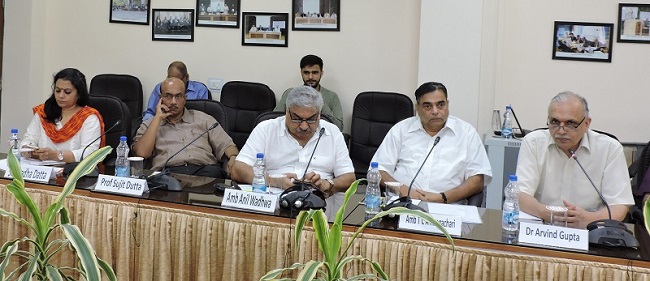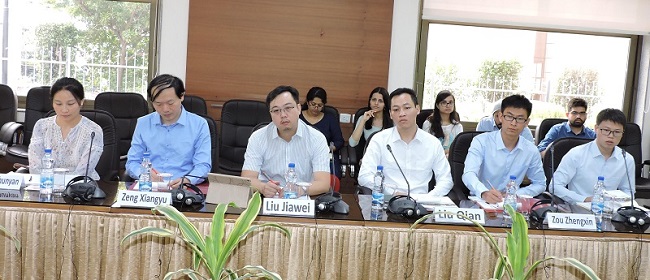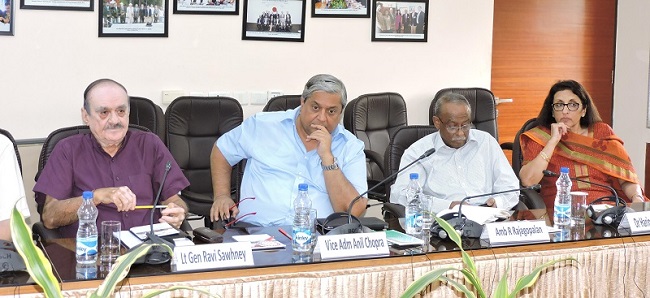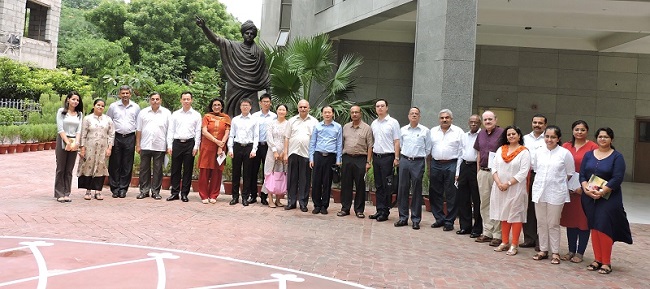The Vivekananda International Foundation (VIF) hosted a Chinese delegation from Sichuan University, Chengdu, on 07 August 2018. The delegation was led by Associate Prof. Zeng Xiangyu and comprised of Associate Prof. Liu Jiawei, Zhang Chunyan, Zou Zhengxin, Wang Tengfei and Liu Qian. Dr. Arvind Gupta, Director VIF, delivered the opening remarks and presided over the session. He raised the structural issues in the bilateral relations and called for introspection from both the sides of the reasons leading to these challenges. Amb. TCA Rangachari delivered the welcome remarks and stressed on the importance of people-to-people contact from both the sides.
There was an in-depth discussion on the international and bilateral issues. International issues affecting both the countries such as Asia Africa Growth Corridor, US-China trade friction and the Indo-Pacific were discussed. Bilateral issues, for instance, the India-China trade deficit, people-to-people contact, water security and language as a barrier between both the sides were discussed. The salient points that emerged from the discussions are enumerated below.

Asia Africa Growth Corridor
The Chinese delegation started the discussion with a presentation on the Asia Africa Growth Corridor (AAGC). Zhang Chunyan made the point that the AAGC is aimed to improve the interaction between the Indo-Pacific region and Africa. She further raised a proposition of the possibility of cooperation between the Belt and Road Initiative (BRI) and the AAGC. The Indian delegates clarified that the AAGC is an idea and still at a consultation stage and further development has to take place on the initiative.
Prospect of India-China Economic Cooperation
Chinese scholar Liu Jiawei proposed that India-China economic cooperation can be the basis to solve strategic issues and enhance mutual trust. The Chinese participants stressed that the bilateral trade between India and China had already reached USD 84.4 billion. China’s export to India is USD 68.06 billion, increased by 16.5 per cent. The import from India to China is USD 16.43 billion. Despite the trade imbalance, India’s import to China has increased by 38.9 per cent in the past year and there is a scope for huge improvement.
Lately, there has been improvement in Indian exports to China. During the Joint Economic Group meeting, held on 26 March 2018, 101 trade agreements worth 28.6 billion dollars were signed between the two sides. China accelerated the provision of market access for Indian agricultural products pertaining to non-basmati rice, rape-seed meals, soya-meals, pomegranate and pomegranate arils, okra, banana and other fruits and vegetables and bovine meat.

As of March 2018, the Foreign Direct Investment (FDI) from India to China was USD 0.86 billion. The Chinese investment in India is USD 8 billion. Given the huge foreign reserve that China has, the investment is not enough. Liu argued that one way to correct the imbalance is to increase Chinese investment in India. Post-Wuhan summit, China has stepped up investments in India. Until now, the Chinese companies have made investments in ‘Make My Trip’ (USD 1.65 billion), while ‘Fosun Pharma’ has invested 1.09 billion in ‘Gland Pharma’, amongst others.
The Chinese delegates also proposed India-China economic cooperation in Venture Capital, the service sector, Information Technology, internet, culture, medical treatment and health. They also proposed industry transfer, especially ‘Light Industry’ from China to India. Since the light industry is a labour intensive industry, it can help solve the problem of unemployment in India.
The Indian side welcomed the proposals from the Chinese delegates. They explained, besides the agreements and Memorandums of Understanding (MoU) between the two sides there is a need to have greater transparency at each level; the need for more market access for Indian goods and easing of the registration process for Indian product in China. At present, the Chinese investments are in brownfield projects only. There is a requirement of Chinese investments in green field projects.

Road Block in the People to People diplomacy
The Chinese participants highlighted that the interaction between both the countries is largely limited to a few cities, especially New Delhi, Kolkata, Beijing and Shanghai. This has created an imbalance of location in the bilateral relations. Most of the Indian students in China take up courses such as medical and engineering and not many students opt for humanities. The abovementioned courses hardly help generate future leaders who can take forward the India-China relations in future. Additionally, the number of people-to-people contact mechanisms is also skewed between the two sides. This has become a critical challenge in the bilateral relations. Further, deteriorating the bilateral relations is the language barrier between the two sides and the absence of long-term educational programme, joint education programmes and joint research projects. The Chinese delegates proposed to start a joint research project on the India-China trade imbalance.
India–China Border
The Indian side highlighted the importance of solving the border issue and the urgency of exchange of maps. They reiterated the future of bilateral relations depends on peace and tranquility on both sides of the border.
Indo-Pacific
The Chinese delegate raised their anxiety about the Quad concept. The Indian delegates explained the concept of Indo-Pacific and clarified that it is a ‘vision’ and not a ‘strategy’. It is not targeted against any country and India is following a balanced approach in its foreign policy.

US-China Trade Friction
The Chinese side argued that the US-China trade friction may have some repercussions for India. It was agreed protectionist trade policies were not in the general interest. Though there are specific issues that need to be settled through agreements.
Water Security
According Zeng Xiangyu, issues pertaining to water security do not pose challenges to the bilateral relations. Water issue as a bilateral challenge between India and China is non-existent, he said. He denied China is diverting the waters from the Brahmaputra on the Tibetan side. He argued that rather than focusing on the international dimensions, India and China should focus on their internal water security which is severe. Both the countries need to be blamed for the crisis. Since both are developing countries and they do not have the technology to manage the usage of water, they are facing water crisis. India and China need to work together on water management, he proposed. The Indian side emphasized that water security is a pertinent issue even at the bilateral level, and there is reluctance on the part of China to share the data on water.
In conclusion, it was agreed that there is a need to start joint research projects that would improve understanding and knowledge about the two countries among academics and policy makers.








Post new comment